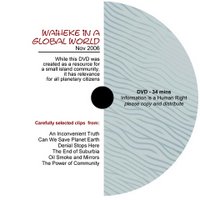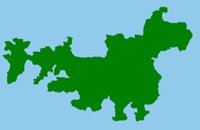
Derek Hayward and I (James Samuel) recognised a need for a DVD which offered a summary overview of the key issues and challenges that we human beings face in a world that is changing faster than we seem to be evolving and adapting.
You can
watch it here.
We wanted to introduce people to some of the films that have spoken loud and clear to us in our search to better understand the world we live in. So we worked with a friend and film editor to bring you an introduction to them. Included in this DVD are some brief comments from Derek and myself about possible responses to the challenges, that we could be making here on
Waiheke.
Here is a list of the films and a description of the specific short clips which are included in this 34 minute compilation:
From:
The Power of Community - A succinct history of Peak Oil and how Cuba came to their own Peak Oil moment with the collapse of the Soviet Union in the late 1980's. It shows a little glimpse of the grass roots response to the need to feed their population, when their oil-dependent agriculture was no longer able to do so.
From:
Oil Smoke and Mirrors - Richard
Heinburg, author of The Party's Over: Oil, War and the Fate of Industrial Societies, and the book
Powerdown: Options and Action for a Post-Carbon World, expresses how easy it is, even for him, to fall into a level of denial about the significant changes that are almost certainly headed our way. A few other highly reputable politicians, business people and a geologist speak about dependence on Oil, the potential for global economic upheaval, and an explanation of why the media is largely quiet on these subjects.
From: David
Attenborough's BBC documentary,
Can We Save Planet Earth - CO2 is made visible in a clever graphic display and explanation of its sources and effects. We hear about China's direction and their part in the growing total of CO2 that is being released into our atmosphere.
From:
Denial Stops Here - Michael
Ruppert offers his insights into the global economic environment and makes some startling suggestions about the implications of the current situation.
From:
An Inconvenient Truth - It is hard to go past Al Gore's big CO2 and Global temperature chart for the last 650,000 years, without asking what might be in store for us.
From:
The End of Suburbia - despite this being the oldest film in the line-up, with footage taken from the Paris meeting of
ASPO (Association for the Study of Peak Oil) in 2002, it's contribution is valuable. This puts recent world events into perspective, and helps explain some of the lead up to them.
We hope this compilation (in all its
amateur and jerky wonder) captures the essence of key issues which are already facing us as we race towards a global population of 7 billion persons. A key message is that each of us needs to learn how to reduce our footprint on this earth, and find ways, through cooperation and mutual support to meet our needs without disadvantaging future generations.
Don't be fooled by the nice looking label (if yours has a label), there is nothing refined about this production. It is our humble effort to share information with you. Now if you know of anyone who wants to throw some money at this project, and have it made into a cleaner presentation, we are more than happy to help. But this was the result of some concerned citizens who squeezed in a few late nights in their busy schedule to put this together with limited technology.
 If you live on Waiheke Island, this blog is for you.
If you live on Waiheke Island, this blog is for you.



